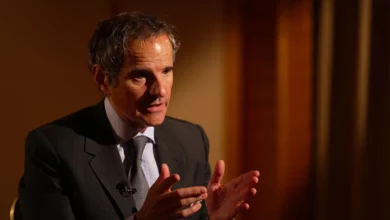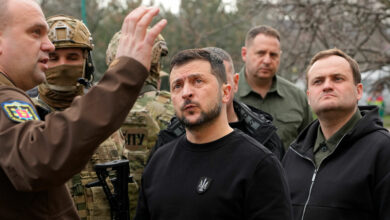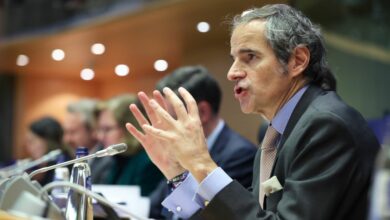Before Mohamed ElBaradei returned to Egypt in February 2010 and dramatically shook up the political scene with his calls for governmental change – some even say helping lay the groundwork for the 25 January revolution – he spent nearly 20 years inside another cumbersome and slow-moving institution, the United Nations’ nuclear watchdog, the International Atomic Energy Agency (IAEA). His book The Age of Deception chronicles his nearly two decades inside the organization.
ElBaradei worked his way up within the IAEA, starting his career there as its legal advisor and finally, in 1997, becoming its director general, a post he held until 2009. In those years, he found himself at the center of the post-Cold War world’s biggest nuclear issues, largely consumed by the attempts of so-called “rogue states” to acquire nuclear weapons.
The Age of Deception is divided into 12 thematic chapters, covering Iran, Iraq, North Korea, and a number of other nuclear hotspots. Throughout, ElBaradei gives a vivid picture of what it was like to be intimately involved at the highest level in the IAEA’s battle for a more peaceful world. By ElBaradei’s recollection, it was a period of deep frustration but also of intensely hard work toward change.
ElBaradei has suggested that he will run for Egypt's presidency in the upcoming elections, so a close observer of Egyptian politics hopes that his book will give a clear picture of his worldview and leadership skills. On that count, The Age of Deception delivers. Indeed, for all except those most fascinated by the annals of nuclear diplomacy it is this glimpse into ElBaradei’s worldview that is most compelling about the book.
The self-portrait that emerges is of a man firmly committed to world peace, multilateral diplomacy, mutual respect between states, and the important role of international institutions such as the UN.
ElBaradei writes about a number of nuclear problem areas, with Iran accounting for four of the book’s 12 chapters. But it is the chronicle of the year before the US invasion of Iraq in 2003 that is perhaps most illustrative of his outlook. It may also be of most relevance to Egyptian readers, as the former diplomat has been widely smeared in local media for supposedly facilitating former US President George W. Bush’s misadventure in Iraq.
ElBaradei’s account of the 2002 search for Iraq’s weapons of mass destruction tells the opposite story: He was a humble international civil servant pursuing the cause of truth at the highest levels of international diplomacy and persistently being steamrolled by an American executive hell-bent on war. While he also holds Iraqi authorities accountable for their lack of cooperation and transparency, it is the Bush administration that proved the most obstinate.
At the end of the chapter “Iraq, 2002 and After”, he lays out what is probably the boldest statement in the book. ElBaradei, whose background is in international law, raises the question that the US invasion of Iraq was illegal. He does not answer the question, but continues, “If the answer is that the war was in fact illegal – and moreover, if consideration is given to the massive civilian casualties incurred – should not the International Criminal Court investigate whether this constitutes a ‘war crime’ and determine who is accountable?” ElBaradei, ever the diplomat, stops short of outright accusation. But he writes that “Legal norms, to retain legitimacy, must be uniform in their application.”
The Age of Deception comes back again and again to this idea of uniformity and consistency of international norms. ElBaradei tries to consistently apply the same standards to Iraq as he does to North Korea and Iran. He drives this point home in a chapter titled, appropriately, “Double Standards,” which deals with nuclear issues in a number of countries not typically considered “rogue states.”
The nuclear issue of the greatest concern to many in the Middle East is not Iran. It is Israel’s undeclared nuclear arsenal. Just as ElBaradei has been smeared in Egyptian media for allegedly supporting the invasion of Iraq, he has also been accused on protecting Israel’s nuclear weapons. In reality, as director of the IAEA, he had little power over Israel since the country does not fall under the organization’s mandate. Still, he raised the issue of Israel’s nuclear program when he could, hoping that it could be held to the same standards as other countries in the region.
It is worth remembering that The Age of Deception is, at its heart, a self-serving project. It should come as no surprise that when writing about his own career ElBaradei presents himself as dedicated to justice, peace and human dignity. I do not question that he held those noble goals, but he conveniently omits writing about the inevitable compromises and concessions that take place in any high-level diplomacy.
The book is not exactly a fun read. It is a memoir of nuclear diplomacy and as such is replete with wonky discussions of centrifuges and reactors, diplomatic memos and policy proposals. With a few exceptions, it offers little in the way of emotional punch.
ElBaradei’s interactions with the belligerent Bush administration during the run up to the US invasion of Iraq leave the reader with a sense of the profound frustration and disappointment that he and his IAEA colleagues felt. After he walks out of a meeting with rude and patronizing US policymakers, the reader’s blood nearly boils with anger at the US administration’s complete contempt for multilateral diplomacy.
The book’s only real moment of tenderness comes when ElBaradei recounts the morning in October 2005 when he learned that he and his agency would be awarded the Nobel Peace Prize. He writes about waiting in his pajamas in his home in Vienna, hearing the announcement on television, crying with his wife and receiving phone calls from his children in London. After almost 200 pages of fairly consistent deception and frustration from Iraq, Iran, North Korea and nearly every other player, seeing ElBaradei and the IAEA rewarded for their stalwart efforts is a great relief.
If The Age of Deception makes clear what kind of president ElBaradei would be in terms of foreign policy, his acceptance speech in Oslo shed a little light on his possible domestic agenda. He writes that he wanted his speech to look at nuclear proliferation in the context of global inequality. “Imagine what would happen if the nations of the world spent as much on development as on building the machines of war,” ElBaradei said when he accepted his prize.




